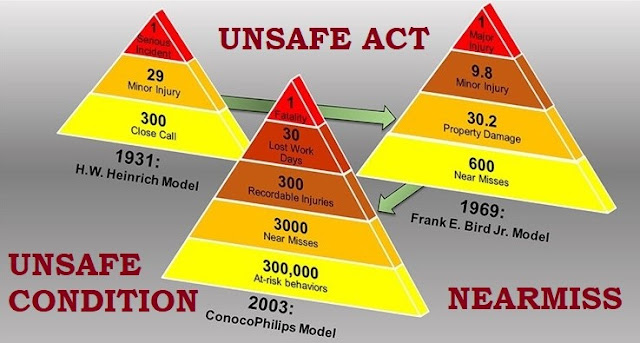Preventing Incidents and Injuries: The Role of
Unsafe Acts,
Unsafe Conditions, and Near Misses
Preventing
Incidents and Injuries: The Role of Unsafe Acts, Unsafe Conditions, and Near
Misses
Unsafe
Acts, Unsafe Conditions, and Near Misses: Understanding the Importance of
Workplace Safety
Workplace
safety is a crucial aspect of any industry, and it is important for employers
and employees to understand the importance of identifying and mitigating unsafe
conditions and unsafe acts. This not only helps to prevent accidents and
injuries, but it also helps to increase productivity and reduce costs associated
with accidents. This will also helps for ensuring the safer workplace that
resulting a safe return of employees.
Unsafe
Acts are done the employees, its defined as any intentional or unintentional
actions that violate safety procedures, policies, and regulations. Examples of
unsafe acts include horseplay, not wearing personal protective equipment,
disregarding warning signs, and improper use of equipment or using the damaged tools/equipment.
Unsafe
Conditions, on the other hand, are environmental factors that pose a threat to
the health and safety of employees. These include floor opening, missing
machine guarding, poor ventilation, and wet floors, to name a few.
Both
unsafe acts and unsafe conditions can lead to serious accidents and injuries,
and it is important for employers and employees to work together to identify
and correct these hazards before they result in an injury or accident. Employees
to be trained on the identification Unsafe Act and Unsafe Condition, the reward
system will motivate employees to report & rectify the same.
A
Near Miss is a close call or almost-accident that could have the potential for
the serious injury if it had not been for a stroke of luck or the quick action
of someone. All the Near Misses to be reported and to be investigated for the root
cause that will help to prevent reoccurrence such incidents. Near Misses are a
valuable tool for employers to identify and address potential hazards in the
workplace, and they can help to prevent future accidents and injuries.
SAFETY CULTURE ASSESSMENT CHECK POINTS
To
ensure workplace safety, it is important for employers to have a comprehensive
safety management program in place, which includes regular safety inspections, safety
committee meetings, top management engagement, safety training, and prompt
correction of any identified hazards. Employees also play a critical role in
maintaining a safe workplace by reporting any unsafe acts or conditions and nearmisses
they observe and following established safety procedures.
It
is also important to conduct regular safety meetings to discuss any near misses
and identify any trends or patterns. This helps to raise awareness and
encourages employees to take an active role in promoting safety in the
workplace.
In
conclusion, Unsafe Acts, Unsafe Conditions, and Near Misses are all critical
components of workplace safety for creating the safer workplace for the
employees for the safe execution of the jobs. By working together, employers
and employees can create a safe and productive work environment, reduce the
risk of accidents and injuries, and increase overall efficiency and
profitability with safety culture in place.
WELDING & CUTTING HOT WORK SAFETY
ELIMINATION OF WORKPLACE HAZARDS
"Preventing
Accidents and Injuries: The Role of Unsafe Acts, Unsafe Conditions, and Near
Misses"
"Workplace
Safety 101: Understanding Unsafe Acts, Conditions, and Near Misses"
"Creating
a Safe Work Environment: The Significance of Unsafe Acts, Conditions, and Near
Miss Incidents"
"Avoiding
Hazards in the Workplace: How to Recognize and Address Unsafe Acts, Conditions,
and Near Misses"
"Workplace
Safety Matters: The Importance of Monitoring Unsafe Acts, Conditions, and Near Miss
Incidents"
“Unsafe
Acts, Unsafe Conditions, and Near Misses: Understanding the Importance of
Workplace Safety”
Workplace
safety, unsafe acts, unsafe conditions, near misses, accidents, injuries,
productivity, costs, personal protective equipment, warning signs, equipment,
hazards, comprehensive safety program, safety inspections, safety training,
correction, regular safety meetings, awareness, promoting safety, efficiency,
profitability.





No comments:
Post a Comment